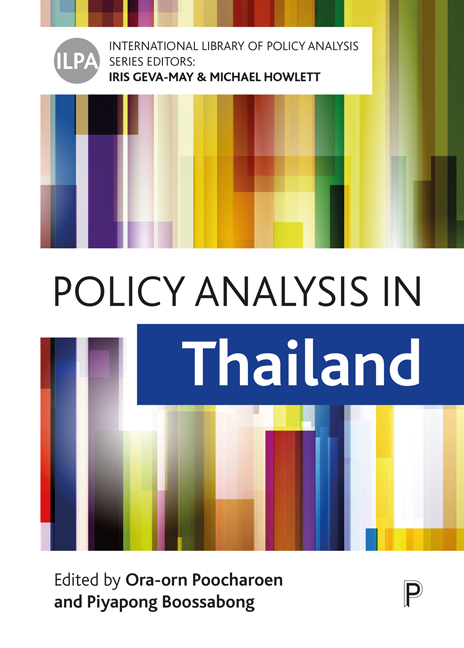Book contents
- Frontmatter
- Contents
- List of figures and tables
- List of abbreviations
- Notes on contributors
- Editors’ introduction to the series
- Introduction
- Part One History, styles and methods of policy analysis in Thailand
- Part Two Policy analysis within executive government
- Part Three Policy analysis beyond executive government
- Part Four Political parties and interest groups in policy analysis
- Part Five Policy analysis education and research
- Index
five - Collaboration, networks and policy analysis in Thailand
Published online by Cambridge University Press: 20 January 2024
- Frontmatter
- Contents
- List of figures and tables
- List of abbreviations
- Notes on contributors
- Editors’ introduction to the series
- Introduction
- Part One History, styles and methods of policy analysis in Thailand
- Part Two Policy analysis within executive government
- Part Three Policy analysis beyond executive government
- Part Four Political parties and interest groups in policy analysis
- Part Five Policy analysis education and research
- Index
Summary
Introduction
In recent decades, intergovernmentalisation and government externalisation have dramatically increased, resulting in governments adapting to operate effectively within their systems. Networks and collaboration, including interaction between public and private sector organisations, have become essential to the policy process and analysis. Policy analysts thus continuously create and employ various frameworks to extract knowledge from practices. According to Fischer et al (2007: xix), ‘policy analysis emerged to both better understand the policymaking process and to supply policy decision-makers with reliable policy-relevant knowledge about pressing economic and social problems’. This chapter aims to provide a better understanding of collaboration and networks regarding the policy process in Thailand. It also aims to discuss the formation and implementation of the two concepts in Thailand's policy analysis. In order to do so, it is important to clarify ‘network’ and ‘collaboration’, the link between them, differences between the two concepts, the analytical frameworks usually employed, and the findings of such analyses.
To begin with, ‘network’ is a term being used in the everyday lives of politicians and public managers to refer to a web of relationships between organisations that work together within entities (Rhodes, 2003). It also refers to ‘clusters of different kinds of actors who are linked together in political, social or economic life’ (Peterson, 2003: 1). In policy analysis, the term usually connotes ‘a cluster of actors, each of which has an interest, or “stake” in a given sector and the capacity to help determine policy success or failure’ (Peterson and Bomberg, 1999: 8). This is based on the policy network approach, which tends to ‘concentrate on elucidating relationships of influence and the direction of interactions which occur in policy-making processes’ (Howlett et al, 2017: 234). This approach is expected to shed new light on the study of policy success or failure (for example, Kenis and Schneider, 1991; Atkinson and Coleman, 1992; Schumaker, 2002; Considine, 2003; Peterson, 2003). For instance, the policy network approach is considered as an ‘important innovation’ (Atkinson and Coleman, 1992) and ‘important explanatory power both on the level of strategic interaction processes as well as on the level of institutional relations’ (Klijn and Koppenjan, 2000: 135).
- Type
- Chapter
- Information
- Policy Analysis in Thailand , pp. 88 - 104Publisher: Bristol University PressPrint publication year: 2023



